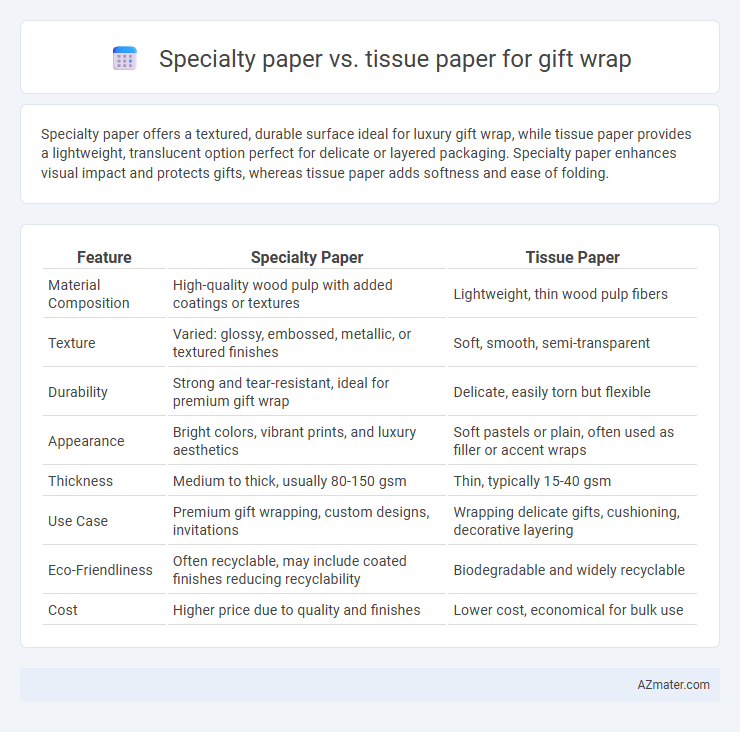Specialty paper offers a textured, durable surface ideal for luxury gift wrap, while tissue paper provides a lightweight, translucent option perfect for delicate or layered packaging. Specialty paper enhances visual impact and protects gifts, whereas tissue paper adds softness and ease of folding.
Table of Comparison
| Feature | Specialty Paper | Tissue Paper |
|---|---|---|
| Material Composition | High-quality wood pulp with added coatings or textures | Lightweight, thin wood pulp fibers |
| Texture | Varied: glossy, embossed, metallic, or textured finishes | Soft, smooth, semi-transparent |
| Durability | Strong and tear-resistant, ideal for premium gift wrap | Delicate, easily torn but flexible |
| Appearance | Bright colors, vibrant prints, and luxury aesthetics | Soft pastels or plain, often used as filler or accent wraps |
| Thickness | Medium to thick, usually 80-150 gsm | Thin, typically 15-40 gsm |
| Use Case | Premium gift wrapping, custom designs, invitations | Wrapping delicate gifts, cushioning, decorative layering |
| Eco-Friendliness | Often recyclable, may include coated finishes reducing recyclability | Biodegradable and widely recyclable |
| Cost | Higher price due to quality and finishes | Lower cost, economical for bulk use |
Introduction to Gift Wrap Paper Types
Specialty paper for gift wrap includes textured, foil, and embossed varieties that offer durability and a high-end appearance, enhancing the visual appeal of presents. Tissue paper, known for its lightweight and translucent quality, is commonly used to add color accents, protect delicate items, and create decorative layers inside gift boxes or bags. Choosing the right type depends on the desired aesthetic, structural support, and presentation style of the gift wrapping.
What is Specialty Paper?
Specialty paper is a high-quality, uniquely crafted paper designed for specific purposes such as gift wrapping, invitations, and packaging, featuring distinct textures, finishes, and colors that enhance the visual appeal and durability. Unlike tissue paper, which is lightweight and translucent primarily used for delicate protection and decorative layering, specialty paper offers a more robust and premium feel ideal for elegant presentations. Its versatility includes options like metallic, embossed, or handmade papers that elevate the unwrapping experience with a luxurious touch.
What is Tissue Paper?
Tissue paper is a lightweight, thin paper commonly used for gift wrapping, cushioning, and decorative purposes due to its softness and translucency. Unlike specialty paper, which includes textured or heavier options like metallic, kraft, or handmade varieties, tissue paper is typically made from recycled pulp and offers flexibility for easy folding and layering. Its delicate nature makes it ideal for adding vibrant colors or patterns to gift packaging without adding bulk.
Appearance and Texture Comparison
Specialty paper for gift wrap offers a polished, glossy finish with a smooth, sturdy texture that enhances visual appeal and provides durability. Tissue paper features a lightweight, translucent appearance with a soft, delicate texture ideal for layering and cushioning fragile gifts. The contrast between specialty paper's elegance and tissue paper's subtle charm allows for versatile decorative uses in gift presentation.
Strength and Durability Differences
Specialty paper offers higher strength and durability compared to tissue paper, making it ideal for gift wrap that requires robust protection and a premium feel. Specialty paper's thicker fibers and enhanced coatings resist tearing and moisture, ensuring the wrapped gift stays intact during handling and transportation. Tissue paper, while softer and more delicate, is less durable and prone to ripping, best suited for decorative purposes rather than structural support in gift wrapping.
Design and Customization Options
Specialty paper offers a wide range of design possibilities including vibrant colors, metallic finishes, embossed patterns, and intricate textures that elevate gift wrap aesthetics. Tissue paper provides soft translucency and subtle color options, ideal for layering or adding delicate accents to gift packaging. Customization on specialty paper often includes personalized prints and logos with high-resolution clarity, while tissue paper customization focuses on printed patterns and branding with lightweight flexibility.
Environmental Impact: Specialty vs Tissue Paper
Specialty paper often incorporates synthetic coatings or additives that hinder recyclability and biodegradability, contributing to a higher environmental footprint compared to tissue paper. Tissue paper, typically made from recycled fibers and free of heavy inks or coatings, decomposes faster and is more widely accepted in recycling programs, making it a more eco-friendly option for gift wrapping. Choosing tissue paper reduces landfill waste and supports sustainable practices through lower energy consumption during production and easier post-use processing.
Cost Considerations for Gift Wrapping
Specialty paper for gift wrap often carries a higher price due to premium materials and unique finishes, making it ideal for upscale presentations but less budget-friendly. Tissue paper offers a cost-effective alternative, providing softness and color variety at a fraction of the cost, suitable for bulk or casual wrapping. Balancing quality and expense depends on the gift's value and presentation importance, with specialty paper enhancing visual appeal and tissue paper optimizing cost-efficiency.
Best Uses: When to Choose Each Type
Specialty paper is ideal for elegant or themed gift wrap, offering unique textures and finishes that enhance presentation for formal occasions or special events. Tissue paper is best used as a lightweight, delicate layer for cushioning fragile gifts or adding a soft touch inside gift bags and boxes. Choose specialty paper for visually striking wrapping and tissue paper for protective, decorative filler.
Conclusion: Selecting the Right Gift Wrap Paper
Specialty paper offers durability, texture, and a unique aesthetic, making it ideal for elegant gift wrapping or special occasions. Tissue paper provides lightweight, translucent qualities perfect for layering or adding delicate accents to gift presentations. Choosing between specialty and tissue paper depends on the desired visual impact, budget considerations, and the nature of the gift, with specialty paper suited for premium wrapping and tissue paper for versatile, cost-effective decoration.

Infographic: Specialty paper vs Tissue paper for Gift wrap
 azmater.com
azmater.com